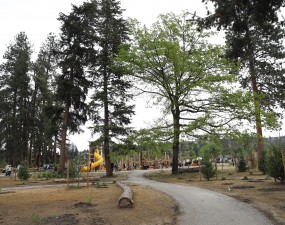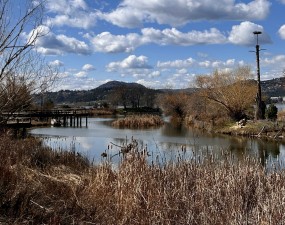Conserving water in our changing valley: Four things you can do right now to be a Water Hero
Topics
By Ed Hoppe | Jul 12, 2022
Between the sparkling lake, the sunny skies and the stunning mountain vistas, living in Kelowna can feel like living in a postcard. Picture-perfect days on the water stretch into memorable evenings relaxing with friends and family, and it’s all capped off with spectacular sunsets that look as though they were painted by hand.
But appearances can be misleading. While our valley is certainly beautiful to look at, it is not a painting, postcard or picture. It is a dynamic living system: a place where the global impacts of climate change interact with local conditions and seasonal cycles. As a result, our summers are getting warmer, drier and less predictable. Our fire season is starting earlier, lasting longer and burning hotter. And as the fastest-growing urban area in Canada, our communities are expanding and evolving every day.
All these changes put a strain on our region’s resources, especially our local water system. It’s a strain my team has witnessed first-hand in recent years, as soaring temperatures and drought conditions have led to watering restrictions and other measures meant to protect our water reserves not only through the dry season, but year-round, as well.
Among those who know just what’s at stake is Shauna Burnell. Burnell has served as Kelowna’s Water Smart Program Contractor for the past several years. She spends her days supporting local homeowners and strata councils through Water Smart Assessments that help to increase irrigation knowledge and reduce water use.
“The Okanagan Valley is already one of the driest regions in Canada,” says Burnell, “and as our city continues to grow in the shadow of climate change, the task of effectively managing and conserving water becomes all the more urgent.”
This is a big job, to be sure. But as Burnell knows well, every big job starts with a few small steps. Here are some easy, low-cost ways to conserve water this summer:
- Collect rainwater in barrels and use it for irrigation: This is a simple, low-tech, low-cost way of reducing the amount of water you’re drawing from the City Water Utility and makes the most of our valley’s natural water cycle.
- Follow local watering schedules: As our communities grow, so does demand on the City Water Utility. One of the best ways to moderate this demand is to stick to municipal watering schedules: even-numbered addresses are allowed to water on Wednesday, Friday and Sunday; odd-numbered addresses are allowed to water on Tuesday, Thursday and Saturday. In all cases, be sure to water between midnight and 6 a.m.
- Mow smart: Traditional turf lawns are extremely thirsty. In fact, residential lawn watering is one of the main reasons that Kelowna has the highest per capita rate of water consumption in Canada. Make your yard more water efficient by using less turf overall, letting your grass grow long, sharpening your mower blades, aerating and topdressing (spreading a thin layer of material like compost or sand over your lawn).
- System checkup: Over time, irrigation systems can become less efficient from things like damaged equipment, sunken sprinklers or misdirected spray. Operating your irrigation system at least twice per year, during the day, can help you catch those issues before major water waste or landscape damage occurs. City of Kelowna water customers can reach out to Kelowna Water Smart to book a free Water Smart Assessment to help with this process.
“These strategies might seem minor,” says Burnell, “but in a place as hot and dry as Kelowna, every little action makes a big difference. Commit to these simple changes and you’re well on your way to becoming the Water Hero our city needs.”
Our valley is changing. And if we want future generations to enjoy those picture-perfect, postcard Okanagan summers, we’re going to have to change with it. "This means thinking about water management in the long-term,” Burnell says, “and it also means doing what we can right now, to conserve this precious resource.”
For more information, visit Kelowna.ca/watersmart.
As the City’s Water Quality Supervisor, Ed Hoppe is passionate about water conservation and protecting our most important natural resource. With a background in analytical chemistry and more than 20 years’ experience as a professional chemist, Ed joined the Water Quality division at the City of Kelowna in 2017, where he oversees our wastewater, drinking water, storm water and source control labs, as well as the water conservation, cross control and customer care programs. Learn more about how Ed and his team protect the water supply and encourage thoughtful water use at kelowna.ca/water.







